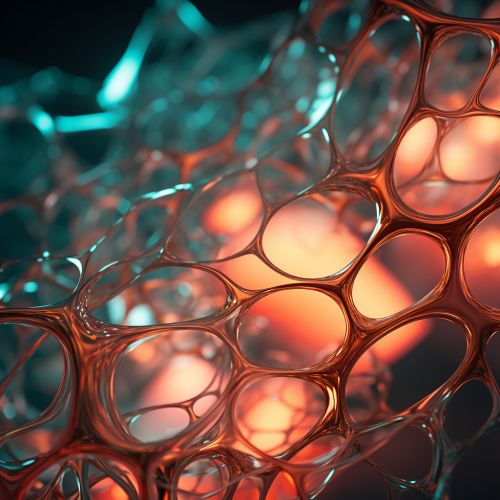Biochemical signaling
Overview
Biochemical signaling refers to the process by which cells communicate with each other using chemical signals. These signals can be hormones, neurotransmitters, or molecules such as proteins and lipids. The process of biochemical signaling is crucial for the regulation of numerous cellular processes, including cell growth, differentiation, and apoptosis.


Types of Biochemical Signaling
There are four main types of biochemical signaling: autocrine, paracrine, endocrine, and juxtacrine.
Autocrine Signaling
In autocrine signaling, cells produce signals that they themselves respond to. This type of signaling is often involved in the regulation of cell growth.
Paracrine Signaling
Paracrine signaling involves the release of signals by cells that affect other nearby cells. This type of signaling is important in numerous processes, including inflammation and wound healing.
Endocrine Signaling
In endocrine signaling, signals are produced by specialized cells and travel through the bloodstream to affect cells throughout the body. Hormones are the primary signals in endocrine signaling.
Juxtacrine Signaling
Juxtacrine signaling involves signals that are not secreted but rather presented on the surface of a cell and interact with receptors on an adjacent cell. This type of signaling is important in the immune response and in the development of organs and tissues.
Signal Transduction
Signal transduction is the process by which a biochemical signal is transmitted through the cell as a series of molecular events, most commonly protein phosphorylation catalyzed by protein kinases, which ultimately results in a cellular response. The molecules that relay these signals are often referred to as second messengers.
Receptors
Receptors are proteins that receive and respond to signals. They are typically located on the cell surface, where they bind to the signaling molecule. This binding event triggers a change in the receptor that results in an intracellular signal cascade.
Signaling Pathways
Signaling pathways are the sequences of reactions that lead to a cellular response. These pathways can be quite complex, involving many different molecules. Some of the most well-studied signaling pathways include the MAP kinase pathway, the PI3K pathway, and the Wnt pathway.
Role in Disease
Abnormalities in biochemical signaling can lead to disease. For example, mutations in signaling molecules can lead to uncontrolled cell growth and cancer. Additionally, defects in signaling pathways are implicated in many other diseases, including diabetes, heart disease, and neurological disorders.
Future Directions
Research in biochemical signaling continues to be a vibrant field, with new discoveries being made on a regular basis. These discoveries not only increase our understanding of basic cellular processes, but also have the potential to lead to the development of new drugs and therapies for a wide range of diseases.
